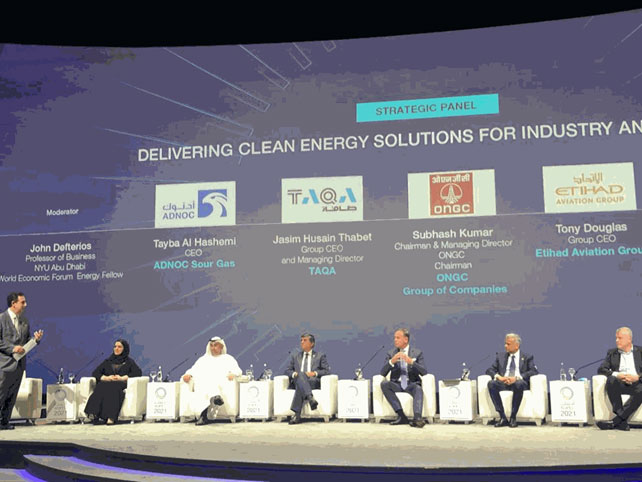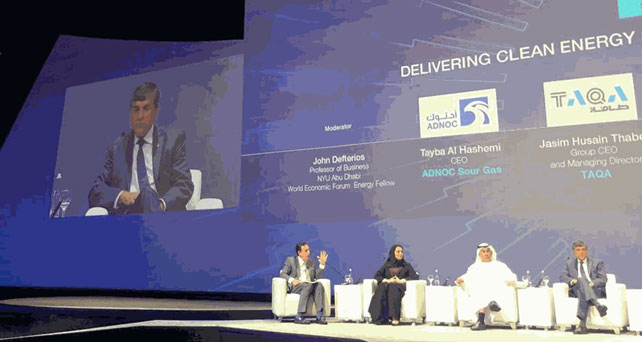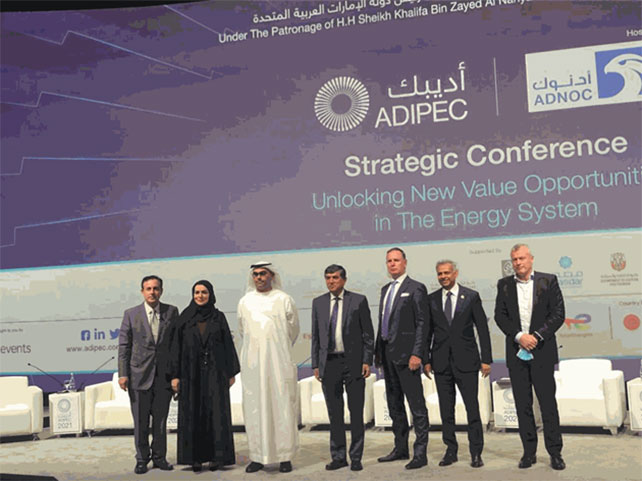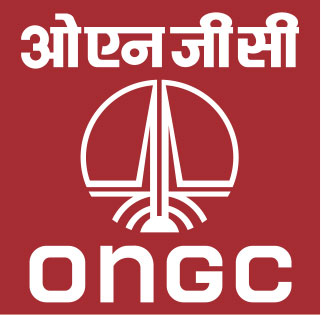The world today is in the cusp of change and that change can only be brought about by collaboration, ONGC CMD Subhash Kumar reiterated during the Strategic Panel Discussion on ‘Delivering Clean Energy Solutions for Industry and Society’ at Abu Dhabi International Petroleum Exhibition & Conference (ADIPEC) 2021. He advocated the need for gradual transition to green energy noting that fossil fuels cannot be phased out on immediate basis without impacting the supply and prices.
The discussion was also attended by Weatherford President and CEO Girish K Saligram, ADNOC Sour Gas CEO Tabya Al Hashemi, TAQA Group CEO and Managing Director Jasim Husain Thabet, Ethihad Aviation Group CEO Tony Douglas and Dr. Ing. President and CEO Christian Bruch. The session was moderated by Professor of Business NYU Abu Dhabi, World Economic Forum Energy fellow John Defterios.

Participants at the Strategic Panel Discussion at ADIPEC 2021
Speaking at the panel discussion on how India is going about the energy transition, ONGC CMD said that as far as the Indian perspective is concerned and the challenge before a national oil company of a country like India is concerned, we have to look at meeting the demand of the large population of the country. “In fact, in one of the sessions, our honorable minister had also shared that today per capita consumption of people in India is one third of global average. So, we have young population, lot of urbanization is happening as a result of which our per capita consumption is also going to increase considerably,” he said. Mr Kumar noted that the challenge before us is to find an ecosystem in which we can help meet the demand of our people.
“Obviously, we are fully aware of the obligations because of the climate considerations, but I also believe that at times we start talking of different solutions to the exclusion of others. As a matter of fact, access to power and energy is one of the fundamental requirements of the growing populations of the world. India has executed probably one of the largest programs in the world, where around 100 million households have been provided LPG connections. So, from that perspective, what we believe in India, is that both sides need proper balancing and consideration,” he said.

ONGC CMD speaking at the discussion attended by industry leaders
Mr Kumar further said that climate change is for real but at the same time it is critical that we agree on a system that helps meet the requirements of all. “And if anyone looks at it, there is the consumption side of it and there is a supply side of it. I trust, in terms of technological improvements which will happen over a period of time, work will happen on both of them,” he added.
“Being an upstream company, I am conscious of the fact that there has to be a constant supply of capital. If we starve this industry of capital for long, the system will hit back, and it won’t be to the advantage to anybody. So, if we need to have an orderly transition, we have to meet the aspirations and the needs of millions across the world. We necessarily have to have a very balanced approach. In terms of technology as well, the world of oil and gas will change for sure. COP26 and what we are discussing today might appear to be different, but the oil industry is taking notice of whatever was discussed there. We will compete but we will also collaborate. From consumer perspective, we also look for a responsible pricing. It can be extremely painful for some countries if fluctuations in pricing keep happening,” Mr Kumar said.
Answering the query on phasing down of coal in India’s energy mix, Mr Kumar said, “As far as the world is concerned, if you look at fossil fuels they constitute more than 80 per cent of the energy mix, but in our case, they constitute more than 91 per cent. Coal is much larger portion of our energy mix than gas. Gas is something where we are at a very low level of around 6 per cent. But what I also believe is that we are also very advantageously placed because we have one of the longest shore line and are pretty close to some of the energy producing countries. I must say and it is a matter of pride that we enjoy very good relations with major producers.”
“We are doubling our pipeline capacity in another two to three years and I am of the firm belief that as far as infrastructure is concerned, if you double it, the demand grows on a logarithmic scale. So, definitely the consumption will go up four times. I can’t imagine a scenario where on an immediate basis coal can be phased out but definitely there is a conscious effort to phase it down in the long term. We believe there will be enough technological development as we know that it is a global problem. As far as climate is concerned, it is not hostage of political boundaries, so world collectively needs to come together to find a solution and from that perspective, I do feel there will be clean coal technologies which will come up, but the country has prepared a blueprint where gas is going to be rammed up. Second, our LNG terminal capacity is going to double in another five years or so. The country is geared for a scenario where gas becomes more prominent element of our energy mix. Coal, from current level of 57 per cent or so, will come down. But, how much time it takes, that’s something to be seen,” he said.

The industry leaders at the Strategic Discussion
Speaking about investment in clean technologies, the CMD said, “I think, we are all in it together. It must be looked into as a one whole, it is not one versus the other. It’s not environment versus transition, it is not only carbon which should be talked of in the world. In order for the world to grow, a lot of energy is needed and all need to pool in.”
The CMD expressed that he feels that fossil fuels are being starved of financing, which can lead to a situation where because of the supply shortages there could be huge fluctuations in prices. “At the end of the day, it's not good for producers and it is not good for consumers. For example, LNG price going up 15-18 times or oil price going from USD 37 to the high of more than USD 80. No producer, no consumer, nobody who is in the system can plan for a business profile, which is so volatile. So, from that perspective we think that the world should take a pause, think and all of us need to move together and find a solution which works for all,” he added.

